Peter MALONE
Saturday, 18 September 2021 19:44
Time to Die, A / Tiempo de Morir

A TIME TO DIE (TIEMPO DE MORIR)
Colombia, 1981, 98 minutes, Colour.
Directed by Jorge Ali Triana.
A Time To Die is a Colombian/Cuban co-production. It is an action feature with psychological overtones, reminiscent of many of the westerns of the '50s.
It has excellent location atmosphere, a portrait of a small Colombian town, explores the theme of the macho image in this Latin American society. it is also a revenge action story, a film of vendetta which focuses on a family, and an older man who has paid his debt to society in prison.
The film is a significant move for the Colombian film industry. When the film is compared with international product, it seems somewhat derivative. However, of itskind, it is well-acted and moves with pace and emotion.
1. Interesting and entertaining film? The Colombian1Cuban? co-production? Latin American cinema?
2. Atmosphere: the prison, the country, the town? Use of locations, beauty, ruggedness?
3. The familiar story: the typical revenge story, justicem hatred? Violence?
4. The macho image: julian-and the memory of his father, his father's anger,hatred and heritage? Pedro caught up in this image? Juan and his past, his present? Macho image and honour, pride, vanity? Tough, life and death? The lyrics of the final ballad?
5. The film's portrait of Juan: the credits sequences and his leaving prison, his journey in the bus, arrival in the town, the absence of 18 years and its effect on him, on the town? His story:, the confrontation with Moscote? Death, the payment in prison for his murder? In himself, his dignity, hopes and longings? Reactions to the people in the town? The possibility of death? Fear? The reunion with Mariana? The build-up to the provocation, the confrontation with Julian? Killing him? His own death? Was it possible for him to live? was his death a matter of fate?
6. Juan's encounters with people in the town: the blacksmith and the memory of his father, the saddle, the horse? The wife to Pedro? The barman and his friendship? The support of the mayor? Sonia's family and their explaining what had happened? The old man in bed playing Russian Roulette? Acceptance in the town, people wishing him to go? His mother's death, the visit to the grave? The old home and his wanting to rebuild?
7. The love for Mariana, the story of her marriage, child, her honourable husband, his looking after Juan's mother? The reunion? The effect on Mariana, her concern about her appearance, her love for Juan, wanting him to leave and be safe? Her visit to Sonia, her giving Juan the gun? The pathos of the farewell? A spoilt life?
8. Julian and his obsessiveness, his macho image? The visit, to the prostitute and his impotence? The warnings to Juan? The clashes with Pedro, the family story, the bloodstained coat of the father? His shooting up the town and the market? Chasing Juan? The challenge? The final fight? His hesitation? Death? Pedro and the influence of brother and father? Admiration for his father, belief in the vendetta? The encounter with Juan? Friendship? Sonials pleading? The brutal fight with his brother? Coming to the arena, the power of the vendetta, his shooting Juan, in the back? The camera moving upwards and leaving Pedro confused in the arena?
9. Pedro and.his friendliness, love for Sonia, the possibility of his change of heart, the fight with Jullan? The irony of the time to die focused on Pedro?
10. The portrait of the characters in the town: the blacksmith and his tear, helping Juan? The barman? Helping Juan with the biood on his face? The mayor and his authority? Sonia's family telling the story? The old roulette man?
11. A revenge film? Latin American style? The impact for local audiences? Impact for world-wide audiences?
Published in Movie Reviews
Published in
Movie Reviews
Tagged under
Saturday, 18 September 2021 19:44
Time to Die, A
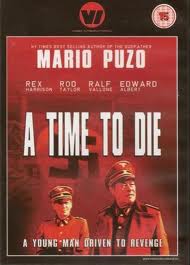
A TIME TO DIE
US, 1982, 91 minutes, Colour.
Edward Albert, Rex Harrison, Rod Taylor, Raf Vallone.
Directed by Matt Cimber.
A Time to Die is a vengeance thriller based on astory by Mario Puzo. It was originally entitled Seven Graves for Rogan but was unsuccessful, retitled and released, especially for video. Edward Albert is the principal star though Rex Harrison as a Nazi, post-war politician and Rod Taylor as an American agent have top billing. There is use of a wide variety of European locations., However, the film merely presents its characters, presents a quest of vengeance, revels in some exploitation of sex and violence. A potentially interesting story is merely given surface treatment. Co-writer and director is Matt Cimber (Butterfly).
1. Interesting war and vengeance thriller?
2. The range of European locations and their use? Action sequences? Musical score?
3. The two titles and their focus on the vengeance theme?
4. Special effects?
5. The war situation: the French-German? border, 1945, French farmers, Michael Rogan as an agent, the German attack, imprisonment and interrogation, the murder of Rogan's wife?
6. Rogan's character, his skills, interrogation, torture? His being shot but surviving? His rehabilitation? His vengeful quest? The encounter with the prostitute and her saving him? Their liaison and her help? The Americans, especially Bailey and their following his tracks? His encounter with the ex-Nazi in the nightclub and killing him? The tracking down of the two garage men, the adaptation of the car, his getting the name of the chief interrogator from them, their chess game in Budapest and the exploding chess piece? The pursuit of the Italian to Sicily, his dying, his forgiving him, his being forced to shoot him? The travels around Europe? The train from Budapest? The encounters with Bailey? The final encounter with the German interrogator, shooting him? The irony that Bailey could not shoot, Rogan? The final image of his being saved? Reunited with the girl? The credibility of the character? his quest?
7. The Nazis and their brutality, the executions? The torture? Rogan's wife, her death, the use of the tape? The ex-Nazis in.civilian life? In the sleazy nightclub, doing deals in the motor business? The Italian returned to his Sicilian family? Rogan's executing them?
8. Bailey and the American authorities, power-broking in Europe after the war, German authorities? Tracking Rogan, the attempts to kill him? Bailey's not killing Rogan at the end?
9. Rex Harrison as the German interrogator? His cruelty?His role as a judge, the administration of justice, the final confrontation with Rogan, his death? The sequence with his wife and Rogan's entering his home? The prostitute, her saving Rogan, her joining with him; relationship, Bailey's offer of money? Their future?
10. An enjoyable action adventure - but the emphasis on the surface rather than depth?
Published in Movie Reviews
Published in
Movie Reviews
Tagged under
Saturday, 18 September 2021 19:44
Tough Guys
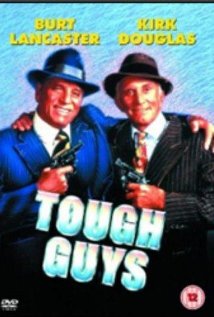
TOUGH GUYS
US, 1986, 104 minutes, Colour.
Kirk Douglas, Burt Lancaster, Charles Durning, Alexis Smith, Dana Carvey, Darlanne Flugel, Eli Wallach.
Directed by Jeff Kanew.
Tough Guys is a nostalgia comedy. Allegedly, its writers were impressed by seeing Kirk Douglas and Burt Lancaster together at the Oscars 1985 and decided to write this film for them. Douglas and Lancaster appeared together in several films over 40 years - including I Walk Alone, Gunfight at O.K. Corral, The Devil's.Disciple, Seven Days in May.
Two oldtimers are released from jail after 30 years (reminiscent of Richard Farnsworth as the Grey Fox set at the beginning of the century). They find the world quite changed - there is comedy in seeing the '80s through their eyes. They don't fit in in jobs or in the old people's home. They decide to do the same robbery that they had done 30 years before. There are some amusing character roles including Eli Wallach as a myopic Leon B. Little with a contract for them for 30 years. Charles Durning is the policeman who caught them. Alexis Smith is an old-time showgirl at the home.
There is humour, action - and a star vehicle for the two stars. Direction is by Jeff Kanew (Natural Causes and the frivolous comedies Gotcha and Revenge of the Nerds).
1. An enjoyable caper movie? A star vehicle for the old stars?
2. The '80s in the light of the '50s? Seeing the 1980s through the eyes of Kirk Douglas and Burt Lancaster? Television, punk attitudes?
3. Age and nostalgia, memory, changes, the old values? The irony of the title - and the relationship to old films?
4. The situation: jail, leaving, 30 years later, their age, Leon B. Little and his firing at them, Deke and his threats and promises? Their prospects?
5. Los Angeles and its changes, buildings, clubs, bars? The punks and their trying to mug the two oldies who beat them at their own game? The open society, frankness?
6. Sarry and Burt Lancaster, in old aqe, going to the home, his style? Meeting Belle and the romance between the two, their conversation, diet and changes? Sharing,the sexual relationship, the reaction of the authorities?
7. The contrast with Archie and Kirk Douglas's active style, Richie and his helping to get him jobs, not feeling at home in the bar, not at home with the people?
8. Skye and her youthfulness, aerobics, attraction towards Archie, the sexual relationship, living together, his opting out?
9. Richie and his admiration, trying to round up the old group, the setting up of the robbery?
10. Deke and his stories, his suspicions? The clash between him and the two?
11. Leon B. Little and his style, the comedy, his insults, his attacks, on the train, going into the river?
12. The past robbery and its success? The decision to do it again? Deke's change of attitude? Richie into the river? Rushing into Mexico?
13. An enjoyable caper, the blend of the humorous and the corny, characters and situations? Time and age? American myths?
Published in Movie Reviews
Published in
Movie Reviews
Tagged under
Saturday, 18 September 2021 19:44
21 Days
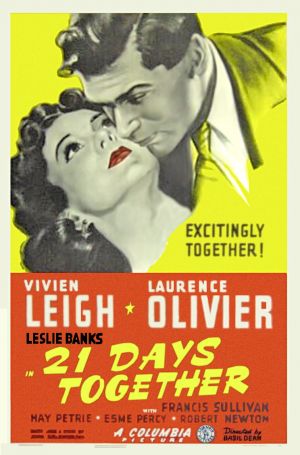
21 DAYS
UK, 1940, 72 minutes, Black and white.
Vivien Leigh, Leslie Banks, Laurence Olivier, Francis L. Sullivan, Robert Newton.
Directed by Basil Dean.
An Alexander Korda production. It featured two attractive stars emerging in the thirties on the screen: Laurence Olivier and Vivien Leigh. They were soon to go to America for Rebecca. Wuthering Heights and Gone With The Wind. They were also to marry. This film is interesting in showing them at the beginning of their screen careers - they also appeared together soon In Lady Hamilton.
However, the film itself is very creaky indeed and hard to sit through. It seems very artificial. Leslie Banks in the other star. The screenplay is by Graham Greene from a story by John Galsworthy - so the credentials from a literary point of view are very good indeed and worth viewing. A prominent lawyer, played by Leslie Banks, is ambitious to become a Justice. He is admired by his colleagues. However, he has a younger brother, played by Laurence Olivier, who has been in the African colonies. He is involved with a married refugee. By accident he kills the woman's husband. There is a cover-up of the killing, an accusation of a beggar who is an alcoholic clergyman who feels that he must atone (Greene material!). As the trial goes on the verdicts go against the accused. The brother and the girl have three weeks in which to be happy - especially after it is discovered that she is not truly married to the man who was killed. He had used her for his own purposes and had an older wife on the Continent.
The 21 days are the happiness of the couple together. At the end. Olivier goes to give himself up as the better thing to do. Ironically at that moment, the alcoholic clergyman dies. The heroine chases Olivier and stops him just in time - they have a future ahead of them. The synopsis reads somewhat better than the film itself. Vivien Leigh is certainly very charming and at ease on the screen. Olivier seems over stylised. The Galsworthy-Greene? issues are quite interesting but in the brevity of-the film and in the contrived scenes and stylised acting, they sometimes seem somewhat ludicrous. However, there are a great number of themes as truth and honesty. integrity, ambition, love. Worth a curiosity look and for some discussion about the styles of British film-making in the thirties.
Published in Movie Reviews
Published in
Movie Reviews
Tagged under
Saturday, 18 September 2021 19:44
Two Faces of Doctor Jekyll, The
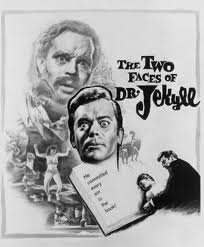
THE TWO FACES OF DOCTOR JEKYLL
UK, 1960, 88 minutes, Colour.
Paul Massie, Dawn Addams, Christopher Lee, David Kossoff, Francis de Wolff.
Directed by Terence Fisher.
The Two Faces of Dr Jekyll is yet another version of Robert Louis Stevenson's famous story. Filmed with John Barrymore, with Fredric March in 1932 in his Oscar-winning performance, with Spencer Tracy in 1941 and then with many television versions with actors like Jack Palance. This version is different and stars Paul Massie. Novelist Wolf Mankowitz has reversed audience expectations. A bearded Dr. Jekyll turns into clean-shaven and dashing cad, Mr. Hyde. Kitty, Dr Jekyll's wife, is unfaithful and having an affair with his best friend, Paul Allen. The dancer-prostitute is a loving woman even though she is murdered by Jekyll/Hyde. The film plays interestingly on audience expectations of good and evil.
There is an interesting supporting cast including Dawn Addams as the wife, Christopher Lee as the best friend, David Kossoff as an adviser. One can glimpse a young Oliver Reed before he is bashed to death by Mr. Hyde. This is a Hammer Films production, directed by Terence Fisher, the director responsible for the revival of Hammer horror films with the Dracula and Frankenstein series from the late '50s. This is a much more restrained horror film, the emphasis on atmosphere and the double standards of Victorian England.
1. The popularity of Robert Louis Stevenson's fable? The two aspects of human personality, good and evil? Good exterior masking evil tendencies? The interest in psychology in the 19th century? In scientific experimentation? The running of risks? Consequences? Victorian England and its surface morality and its lack of morality under the surface?
2. The atmosphere of 19th century, Victorian England, repression, sexuality, violence, the human psyche and freedom? Responsibility and irresponsibility?
3. Hammer film production; wide screen re-creation of the period, the laboratories, the atmosphere of the psychological rather than the violent, London society, the inns and taverns, high society? The musical score?
4. The introduction and explanations about human nature, human freedom, the inner psyche, moral responsibility, playing God? The long discussions between Dr. Jekyll and his friend? His using children as an illustration - serious behaviour and play? Jekyll wanting to explore this in his own psyche?
5. The effectiveness of the unexpected device of the bearded Jekyll and the handsome Hyde? The reversal of roles of the unfaithful wife and the faithful mistress?
6. Jekyll and his personality, his experiments and laboratory, cold, his relationship with his wife, her affair with Paul? His reliance on the friendship of the doctor? The experiments, injection, his keeping a diary, his consciousnee of change? His charity towards the children on his property? The change in Dr Jekyll, the take-over of Mr Hyde? The difficulty in knowing who was acting? The interior dialogues between himself and Hyde with the same voice? His looking in the mirror and Hyde looking back? Dr. Jekyll continually re-emerging? Hyde taking over Dr. Jekyll? The ultimate responsibility as he returned to his person of Dr Jekyll?
7. The contrast with Hyde: handsome and smooth. free, the echoes of Dorian Gray, experimentation with the self-indulgent life, opium, sex, the Snake Woman and the affair, his determination to seduce his wife, giving Paul Allen the money in order to destroy him, the bashing of the man at the inn, mixing with low life, the opium den, the boxing, the gambling, being beaten in the streets, coming and going? Setting up Paul? Finally killing him with the snake? His hounding his wife and her suicide? The Jekyll/Hyde murdering of the prostitute? His talking back to Jekyll from the mirror? The schizoid conversations? The setting up of Jekyll's death? Hyde being overcome by Jekyll?
8. Kitty as the faithful wife, the cold relationship with her husband, external decorum, the affair with Paul Allen, going to the tavern, being sen by her husband yet not knowing it? The strength of the affair with Paul, the borrowing of money, her resisting Hyde? The build-up to Paul's death, her own mental breakdown and crashing suicide?
9. Paul as the suave best friend, his betrayal, his being with Kitty, his violence, sexuality? The clash with people at the hotel? Borrowing money, the friendship with Hyde? His being killed by the snake?
10.The prostitute, her dance, her attraction towards Hyde, not worrying whether he was good or evil, her being killed?
11. The Picture of frivolous and wealthy society? External decorum? Behind closed doors lack of restraint?
12. The contrast with the doctor and his advice, the police and their investigations, the children and the nurse and Jekyll terrifying the child?
13. Stevenson's story as a moral fable about the good and evil in each person? About the arrogance of scientific experimentation? About freedom becoming license? His critique of Victorian society?
Published in Movie Reviews
Published in
Movie Reviews
Tagged under
Saturday, 18 September 2021 19:44
Two Friends / 1986
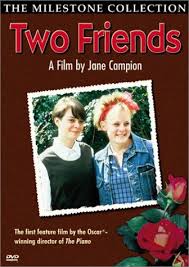
TWO FRIENDS
Australia, 1986, 76 minutes, Colour.
Kris Bedenko, Emma Coles, Kris Mc Quade, Peter Hehir.
Directed by Jane Campion.
Two Friends is an arresting telemovie. It was also award-winning and was taken to the Cannes Film Festival. It is the first feature-length film by director Jane Campion and is based on a screenplay by novelist Helen Garner. The film focuses on teenagers in Sydney, their relationships, their parents. It also focuses on school, hopes and ambitions, dropping out. The film is striking in its use of reversing the time process (as did the film of Harold Pinter's play, Betrayal). The film starts in the present and continues to go back in time so that we see the broken relationship and where it came from.
1. A portrait of people? Of times? Of friendships? Teenagers? Adults?
2. The quality of the A.B.C. telemovie? Production values? Brevity? The use of Sydney, Bondi and the suburbs, homes and school, the world of teenagers, the adult world? The score and contemporary songs?
3. The structure: beginning in July, going back to February, January, December and the preceding October. The effect of watching these incidents and characters? 1
4. Audience resporse to the time structure: audiences capable of moving backwards, Louise and her ordinariness, Kelly and her change? The adults and their relationships? Audiences knowing what had happened, asking continued questions of why and how it happened?
5. Starting at the end and going back: the experience of school, the developmentl of the parents and their attitudes, the dashing of hopes, changing relationships, questions of sexuality, dropping out, death?
6. The focus on Kelly: death, punk behaviour and dress, thenbeach, being seen, her illness, the letter, the mother's birthday, the break with the family, going out? Questions about her future? Dropping out? Her father, his friends, advances and their effect? Poole and the boy at home? Holidays, the two girls together, shopping? The concert and school, the father and his attitude towards her school choices and future? Parents and divorce? Back to seeing her as an ordinary schoolgirl, the relationships, her hopes? A modern girl?
7. The contrast with Louise: talk, friendship with Kelly, ordinary, relationships, her parents, especially her mother, schools, the holidays and the buying of the uniform, Matthew, the hopes for city girls high, the interviews? A young modern girl?
8. Kelly's mother, the children and the exasperation, Malcolm and his boorishness,and refusingpermission for the school, condemning it as uppity? Kelly's father and his friend, the sexual advances, going out, etc?
9. Louise's parents, the opening with the funeral, at-home, father and pleasantness, Janet and dare, especially for Kelly? Phone calls, Kelly's stay-over, the shopping for the uniform, meals, school and plans? Friendship and talk?
10. The portrait of the parent generation? Louise's mother and her care and concern? Kelly's mother and stepfather? Her father and friend?
11. The glimpse of Sydney, home life, school, the beach, the teenage culture?
12. The opening of the film and the end of the process: the two friends and what they had experienced, the writing of the letter, hope for a future?
Published in Movie Reviews
Published in
Movie Reviews
Tagged under
Saturday, 18 September 2021 19:44
Tale of Two Cities, A/ 1958
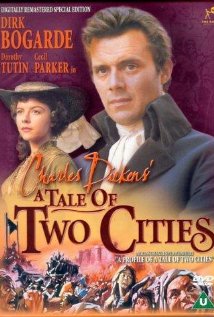
A TALE OF TWO CITIES
UK, 1958, 117 minutes, Black and white.
Dirk Bogarde, Dorothy Tutin, Christopher Lee, Athene Seyler, Rosalie Crutchley, Ernest Clark, Stephen Murray, Paul Guers, Donald Pleasance, Ian Bannen, Cecil Parker, Alfle Bass.
Directed by Ralph Thomas.
A Tale of Two Cities has been filmed several times. The classic version was Jack Conway's 1935 version with Ronald Colman as Sidney Carton. There was a long telemovie version in the late '70s with Chris Sarandon in the central role.
This British version is respectable, but does not have the flair of the '30s version. It was directed by Ralph Thomas, a director who worked on a variety of film genres in England in the '50s and '60s, especially with Dirk Bogarde, including Doctor in the House, Campbell's Kingdom.
The film has an excellent cast. There is location photography, a sense of period - and a fidelity to the narrative of Charles Dickens.
1. The popularity of Dickens' novel? The various film versions? Audience fascination with the 18th century, English aristocracy, French aristocracy and the details of the Revolution?
2. Black and white photography, locations? Sense of period? The special effects for the Revolution? Musical score?
3. The world of Dickens - the range of characters, their interaction, dramatic situations, comic touches? How well transferred to the screen?
4. The background of the French Revolution: the storming of the Bastille, the populace taking to the streets, the imprisonment and execution of the aristocracy? The guillotine in the square? The film's attention to these familiar details? The danger for French aristocracy, unjust imprisonment? The oppression of the nobles - especially from the St Evremonde family? The British and their attitude towards the Revolution? The saving of French victims? Dickens' sympathies?
5. The focus on Dr Manet - his work, his imprisonment in the Bastille, his release, his being returned to England, the reunion with his daughter Lucy? The connection with the St. Evremonde family? Lucy as heroine? Her love for Charles Darnay? The irony of his being the nephew of the Marquis? His return to France? Lucy and Dr. Manet's plight, the return to France to plead for him? The vengeance of the Defarges? The imprisonment of Darnay? The substitution by Carton? The happy reunion for Dr. Manet, Lucy and Charles?
6. Jarvis Lorry and the opening of the film? His work in connection with Dr. Manet? Friendship with the family? Relationship with Sidney Carton? His help during the episodes? The character of the Englishman concerned about the French?
7. Sidney Carton and his work as a lawyer? Dirk Bogarde's style? His seeming disdain for life? His drinking? Cynicism? His encounter with Dr. Manet and Lucy?. His devotion to duty? The difficulties in France? His journey to help? His discovery of Basard and confrontation with the Defarges? The Pleading of Lucy? His decision to take Darnay's place? The dramatic tension of his entry into the Bastille, his getting Darnay out? -His going to the guillotine with the prisoners, his consoling the servant? The famous Sidney Carton statement: It is a far, far better thing I do ... 'The laying down of life for others? A final heroism?
8. The Marquis St Evremonde and his oppressive behaviour, wealth, tyranny? His murder?
9. The populace of Paris, the reaction against oppression, the justification of the Revolution? The executions? The Defarges and their involvement? Their experiences with the St. Evremonde family? Madame Defarge and her vengeance? Her attendance at the executions? her vindictiveness against Dr. Manet despite his victimisation? her vendetta against everyone associated with the,family? The clash with Miss Pross? Her death? The vindictiveness of the other women attending the executions?
10. Miss Pross and her place within the household, the journey to France, the genial and fussy Englishwoman, her heroism in the struggle with Mme Defarge?
11. The popular ingredients of Dickens' novel? The re-creation of the 18th century and the Revolution? The popular types? The final heroism?
Published in Movie Reviews
Published in
Movie Reviews
Tagged under
Saturday, 18 September 2021 19:44
Trial
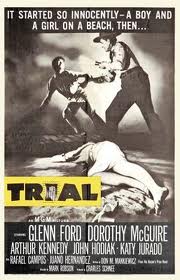
TRIAL
US, 1955, 109 minutes, Black and white.
Glenn Ford, Dorothy Mc Guire, Arthur Kennedy, John Hodiak, Katy Jurado, Rafael Campos, Juano Hernandez, Robert Middleton, John Hoyt.
Directed by Mark Robson.
Trial is a dramatic film about justice, racism, communism from the mid-50s. Filmed in black and white, with strong screenplay by Don Mankiewiez (from his novel; Mankiewlez was later to write I Want To Live), the film was directed with strength by Mark Robson. It has a very good cast and Arthur Kennedy was nominated for an Oscar for Best Supporting Actor. Glenn Ford was beginning a very solid M.G.M. career at this stage, after his work with Columbia. He was to make numerous films within the next ten years and become one of the popular stars. Dorothy McGuire? gives warn support.
The film focuses on an American town in 1947, prejudice against Hispanics, bigotry even to lynching by the irate citizens, the difficulties of the admiinistration of justice. It is also anticommunist and highlights the movements of the '40s with communists using the courts for their own purposes. However, the film is also critical of Mc Carthyism; in the background there is reference to a commissioner called Battle holding sessions for unAmerican activities (echoing Mc Carthy and critical of him).
While aspects of the film are definitely of the '40s and '50s, -it nevertheless is quite an involving drama.
1. A film, of the '50s, Justice, bigotry, anti-communism?
2. M.G.M. production values, black and white photography, 1947 setting, the town of San Juno, the beach, homes, the court? The New York rally? Evocation of period? The offbeat score?
3. The prologue and the events at the beach, the audience as witnesses to the events, uncertain of what happened? The arrest of Chavez, prejudice against the Mexican?
4. The town, its prejudice, the funeral and the bigoted men going, wanting a prayer? Echoes of the Ku Klux Klan? The lynch group at the prison? The sheriff and his fear, being persuaded to warn them off? Politicking the background? The prosecutor and his status in the town? The weeks taken to get the jurors, their links with the sheriff, racist attitudes? The proceedings of the case, the papers and the nationwide coverage?
5. Glenn Ford as David: law professor, his work, seeking cases, in court? Meeting Barney and Abbe? Barney's pressure about the case, in the restaurant? The interview with the prosecutor? Seeing Chavez, knowing him innocent? His mother? Preparation of the case, no plea bargaining? Barney summoning him to New York, the rally, his speech, being cut off, his reaction, going home, anger at Abbe? His relationship With Abbe, her help in the preparation of the case, personal? The jurors and their selection? The discussion with the black judge and his accusing David of prejudice? The witnesses, the cross-examination? The adjournment at the wrong moment in the questioning of the doctor? Testing out the young man's spotlight? The proceedings of the case, his relationship with Chavez, Chavez reading law books? Barney's return, taking over, the debate about Chavez going on the stand? Barney's railroading? Learning the truth about Barney from Abbe? The argument, off the case? Mrs Chavez and her hostility? Going to the library, his final speech in the court, blaming himself for not giving Chavez an adequate defence, his plea? The reconciliation wIth Abbe? His being pursued by the UnAmerican? Activities agent? Delaying his -interview, its probably being cancelled - the president not wanting to debate With David? His future?
6. Barney and his shrewdness, pushing David into the case, the research? Going to New York for funds, the rally, his meticulous planning, the gestures, giving $50 for a donation? His signals, demagogue, the talk, Mrs Chavez, her support of him? Forcing David into a situation, cutting off the microphone? His return, making Chavez a victim? His making Chavez take the stand, the loss of the case? The clash with David? His anger in the court, bigotry, trying to provoke the Judge, being seen as a martyr? David and Abbe, her work, personality, love? The accuracy of her information, not worried about New York? The confrontation, the atmosphere of the warning David, '40s and '50s and communist fellow travellers, her story, her anticommunist stances? In court? Talking with Mrs Chavez? The end?
8. The prosecutor, his status in the town, offering deals, hard line, the interrogations, skill in cross-examination, especially of Chavez? His speech at the end supporting David?
9. The sheriff, racism, the lynching party, people paying him to get into the prison, talking the men off, laughing during the trial?
10. Chavez: his age, experience, the actual events, the girl and her medical condition, his encounter with her, going up the steps, her death, his call for help? His studying of law, his respect for David? His artwork and gifts? Going on the stand, the questions of the biology classes and his signature? His mother, love for her son, going to New York, her anaer against David, the apology?
11. The black judge, the possibility of justice being done, his being considered a legal scapegoat? David's anger and his wise response? The interrogation of the jurors, tactics, the adjournment and the doctor's testimony? His final confrontation of Barney? The end?
12. The undertones of McCarthyism?, anticommuniist persecution? unAmerican activities? The man watching him, the reputation of Battle?
13. The themes of 1947 and racism, the state of America after World War Two, communists and anticommunism, the cold war? Rallies and groups, tactics?
14. The court case, the evidence, the girl and her medical condition, her parents? The truth of the matter? Justice being done?
Published in Movie Reviews
Published in
Movie Reviews
Tagged under
Saturday, 18 September 2021 19:44
Starship Invasions

STARSHIP INVASIONS
Canada, 1977, 89 minutes, Colour.
Robert Vaughan, Christopher Lee, Helen Shaver.
Directed by Ed Hunt.
This adventure looks like a derivative of both Star Wars and Close Encounters of the Third Kind. It has intergalactic battles with adventures between good and evil and empires trying to control space as well as benign visitors in flying saucers. Robert Vaughan is the taciturn star but Christopher Lee is at home in this kind of elegant villainy. The special effects are quite good although there are some gruesome touches especially with a suicide epidemic and its visualization. The film is a Canadian production written and directed by Ed Hunt. It is minor but interesting enough of its kind.
1. The seventies' trend for space exploration and drama? Encounters with UFOs? Why the popularity with space themes? Audience interest in science fiction, science fantasy? The mysterious aspects of the present, looking ahead to the future?
2. The influence of 'Star Wars and its style, space adventures and wars? The plausibility of such intergalactic warfare? The importance of the presentation of the clash between good and evil, literal black and white? Causes, issues? (the importance of visual special effects for such adventures and battles?).
3. The plausibility of UFOls? Interest in them during the sixties and seventies? Excitement, plausibility, scientific aspects, the popularity in the media? The purpose of UFOs and interplanetary visiting? The science fantasy fascination of UFOs?
4. The plauaibility of life on other planets? The atmospheres of the planets, the possibilities of travel, the evolution of intelligent beings? Comparison with earth and human beings?
5. The technical aspects of the film, special effects, colour, score? A Canadian production and values?
6. The impact of the opening and the invasion? The rebels and their being dressed in black and the sinister presentation of their dress? Their communication and their not speaking? Ramases and Christopher Lee as the central villain? The landing of the flying saucer, the power over the human being and his ordinariness on the tractor? The control over him. sexuality, suicides? (the lack of following up these themes in great detail, although the stress on the number of suicides?).
7. The atmosphere of the rebels, their being renegades in space, Ramases and his ambitions, his aides both masculine and feminine? Their skills, the raid on the underwater station, their power to kill? Their growing control? Their capacity for destruction and their aims at controlling earth? What kind of evil did they represent?
8. The contrast with the League? The appearance of the mutant type persons, human beings working with them? Their underwater station, their becoming victims of the rebels? The nature of their civilization and its qualities? Communication, technology, the use of robots? The importance of computers and their getting the computer help?
The robot and his important role in saving and destroying the rebels? The capacities of the League to heal especially Duncan's wife? The significance of their ultimate victory? Benign interplanetary intelligences, benign visits of UFOs?
9. Allan Duncan as representing the human race? As a person in himself, his television interviews, scientific background and interest in astronomy, growing interest in UFOs? Relationship with his wife and daughter and their characterization? Clashes with his wife? Friendship with Malcolm? His being taken by the League, his willingness to help, his watching events on the television, his being able to save the day? An interesting character?
10. Malcolm and his scepticism, his help?
11. The portrait of the wives, Allan's daughter? Their interest in UFOs, the reaction to their husbands' disappearance, television interviews, grief? The supermarket scene and the death? Allan's wife killing herself and the impact on her daughter? (was she killed merely so that the League could benignly raise her to life?), the happy ending?
12. The visuals of intergalactic battles and strategy? Explosions? How satisfying the presentation of the battles?
13. An appropriate happy ending? The status of UFOs, their peaceful presence in the universe? An optimistic film in its presentation of the clash between good and evil? For what audience was it made? The exploitive elements of sex and violence and suicides and their impact on young audiences?
Published in Movie Reviews
Published in
Movie Reviews
Tagged under
Saturday, 18 September 2021 19:44
Start the Revolution without Me

START THE REVOLUTION WITHOUT ME
US, 1970, 98 minutes, Colour.
Gene Wilder, Donald Sutherland, Hugh Griffith, Jack McGauran?, Billie Whitelaw, Victor Spinetti, Ewa Aulin, Rosalind Knight, Harry Fowler, Murray Melvin, Graham Stark.
Directed by Bud Yorkin.
Start the Revolution Without Me was also known in its working title as Louis, There’s a Crowd Downstairs as well as Two Times Two. The film is a loose and spoof adaptation of elements of Dickens’ A Tale of Two Cities as well as the Dumas novel The Corsican Brothers. It capitalises on misplaced twins, one in the aristocracy, one amongst the ordinary citizenry. This time there are two on the eve of the revolution.
The film has a witty screenplay – with quite some innuendo in the spirit of 1970. It is colourful in its presentation of its period, has Hugh Griffith and Billie Whitelaw as Louis XVI and Marie Antoinette as well as a number of British character actors in support.
The film was directed by Bud Yorkin, a television director who made such films as Divorce American Style and Inspector Clouseau in the 1960s. His best serious film was the 1984 Twice in a Lifetime with Gene Hackman and Ellen Burstyn and Ann-Margret?.
An entertaining spoof of historical movies. The narration is by Orson Welles.
1. The indication of the tone of the title for parody, skit? Audience expectations from historical parody, comedy?
2. Audience enjoyment of costume drama? Equal enjoyment of parody? The light tone, the risk of the banal? What is the point about such an elaborate parody? Does an audience have to have historical background to enjoy It? Its relevance for a modern audience?
3. The film's use of colour, costumes, locations, music? The background of Alexandre Dumas and his novels? The background of the French Revolution? Presuppositions In audiences about France and the 18th century, the mock heroic?
4. The Introduction of Orson Welles at the beginning, the narrative, the setting, the 20th century background? The resumption of this at the end and the shooting of Welles? The 20th century lack of a solution?
5. The humour of the times and places, especially the sign repetition of 1789 and the parody of historical films and narratives? Was this successful, why?
6. The build-up to the birth of the two sets of twins? The farcical nature, the parallelling of the mothers, the fathers, the work of the doctor, priorities for rich and for poor, the mix-ups of the children? The arrivals of the second children? The humour of the mixing up of the pairs?
7. The transition to Corsica? The background of the story of the Corsican Brothers? Their characters, cruel, unlovely? The cruelty of the brother towards his wife and her devotion to him? The self-centredness and camp performance of the other brother? The deals with the Duke, with Marie Antoinette, betrayal of the King? The historical implications? The mocking of traditional heroes? Their petty quarrels amongst themselves of who was to go first etc.?
8. The contrast with the peasant brothers, the fact of their cowardice amongst the Revolutionaries, their pretending to be injured? Their being taken to task by Jacques? Their romance with Mimi?
9. The humour of the mix-up In the city with both brothers in peasant dress? The performances of Gene Wilder and Donald Sutherland and the differentiation between the two twins? The Corsican brothers in peasant dress and their arrogance, the ordinariness of the peasant brothers and their being dressed up within the palace? How much humour to be derived from the charaterisations and the mixup?
10. The situations in the castle, the different identities, the satire on politics and deals?
11. The picture of Louis XVI as incompetent, foolish? The comedy in the portrayal of the King? His cowardice, signing treaties, the possibility of warding off the Revolution, packing his bags to escape?
13. The satire in the presentation of Marle Antoinette as a nymphomaniac? Her liaisons, ambitions, using men for her own purposes? The Duke, the Commander of the Guards, the Corsican Brothers themselves?
14. The Duke and his plans? The mastermind? The victim of the farce because so serious? The deal with the Corsican brothers, with Marie Antoinette? Betraying them both? His assistant? The soldiers disguised as monks etc.? The farcical presentation of the villain and his defeat?
15. How humorous the situations, reliance on knowledge of the situations, the Revolution? The picturing of the Revolutionaries and their fanaticism? The utter disregard of Royalty for the Revolutionaries? The Man In the Iron Mask?
16. The two women: the princess and her not being authentic? Mimi and the burning of the farm, the torture? The two trying to prove that they were sisters or not?
17. The fact that the Revolution might have been warded off? The humour of the granting of freedoms being trodden under? The Revolutionaries so keen for a Revolution?
18. How humorous was the final mystery? The transition to the 20th century and the shooting of everyone? Could there have been any other ending?
19. The purpose of this kind of parody and its effectiveness?
Published in Movie Reviews
Published in
Movie Reviews
Tagged under